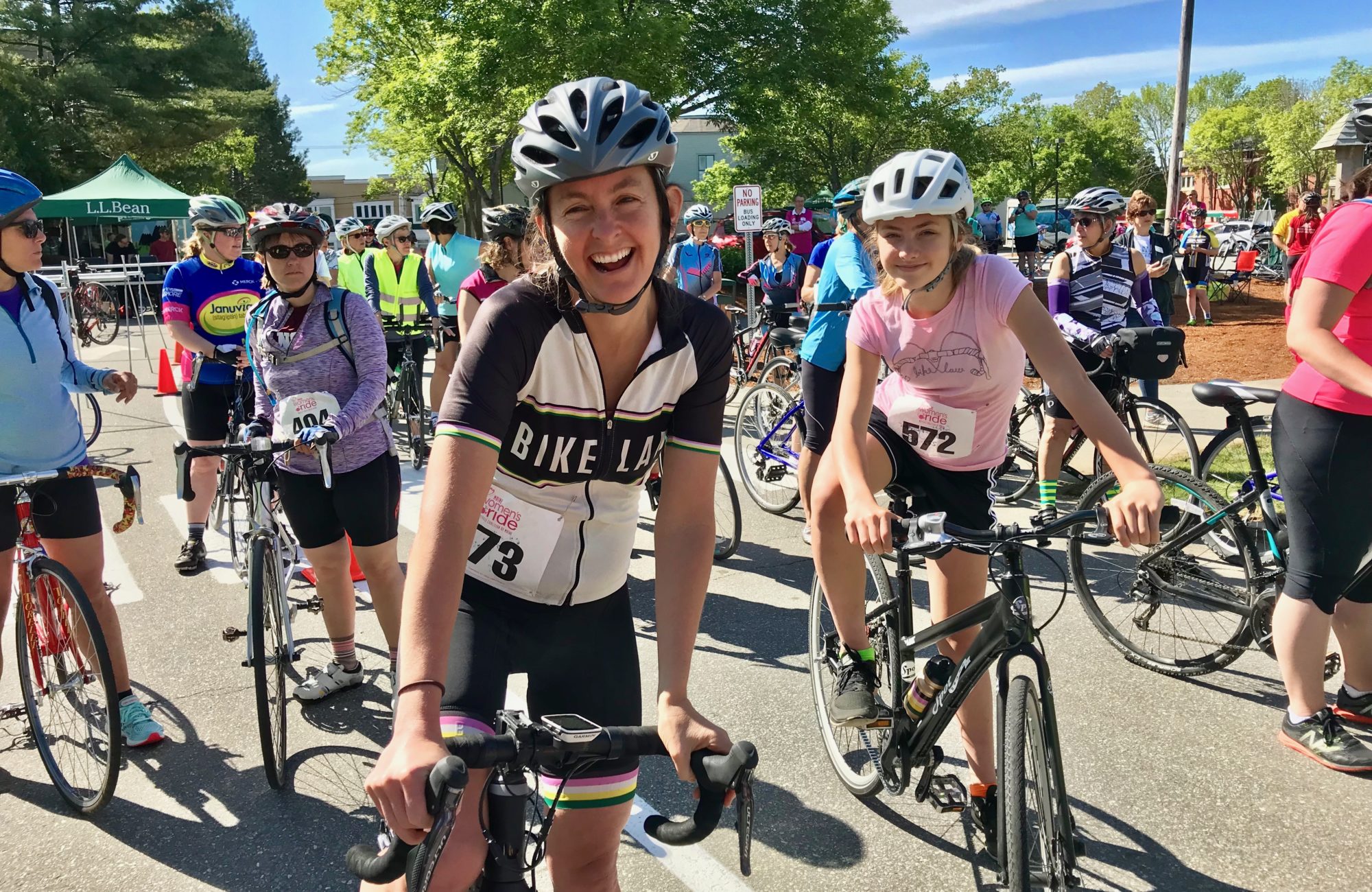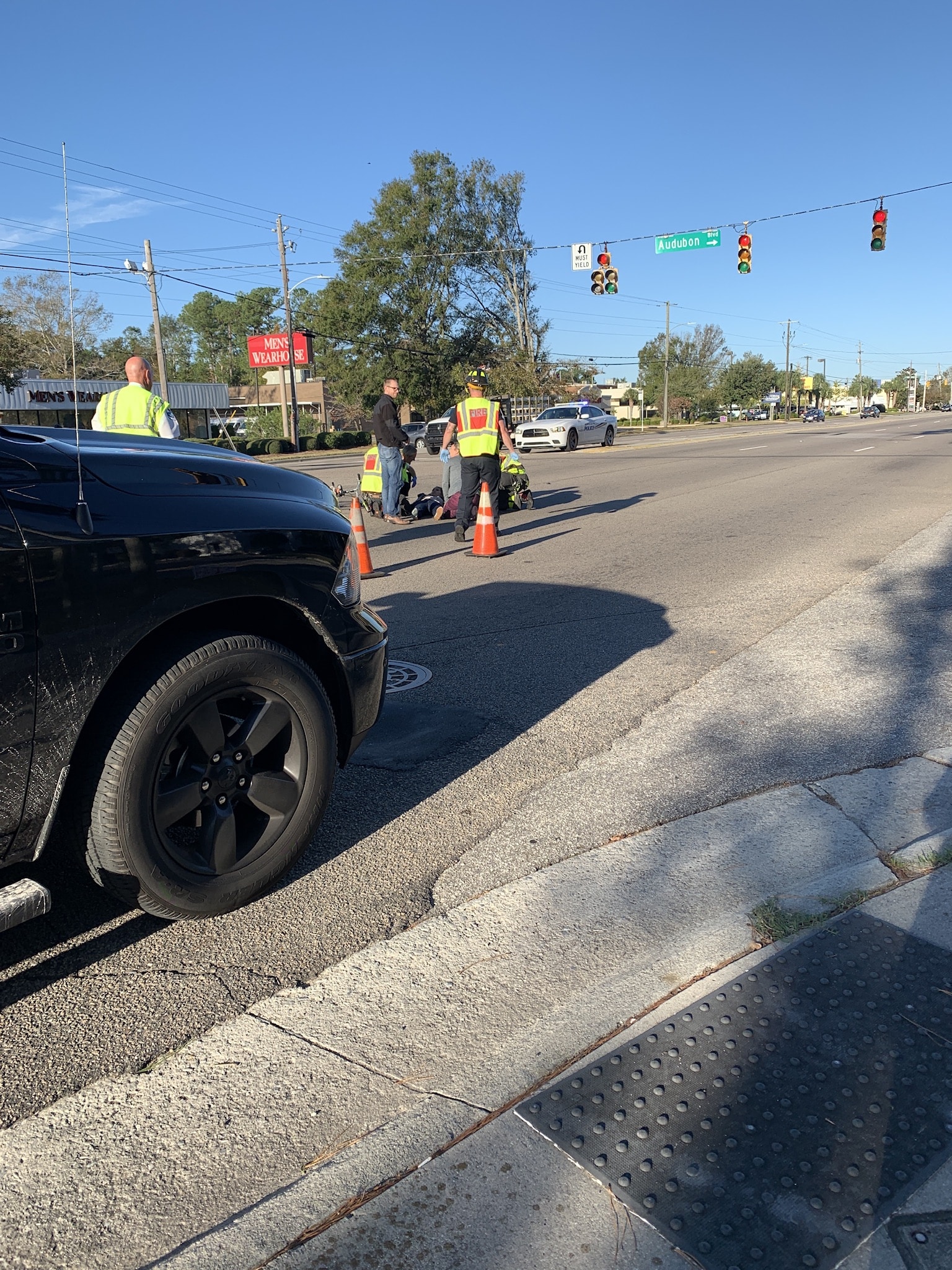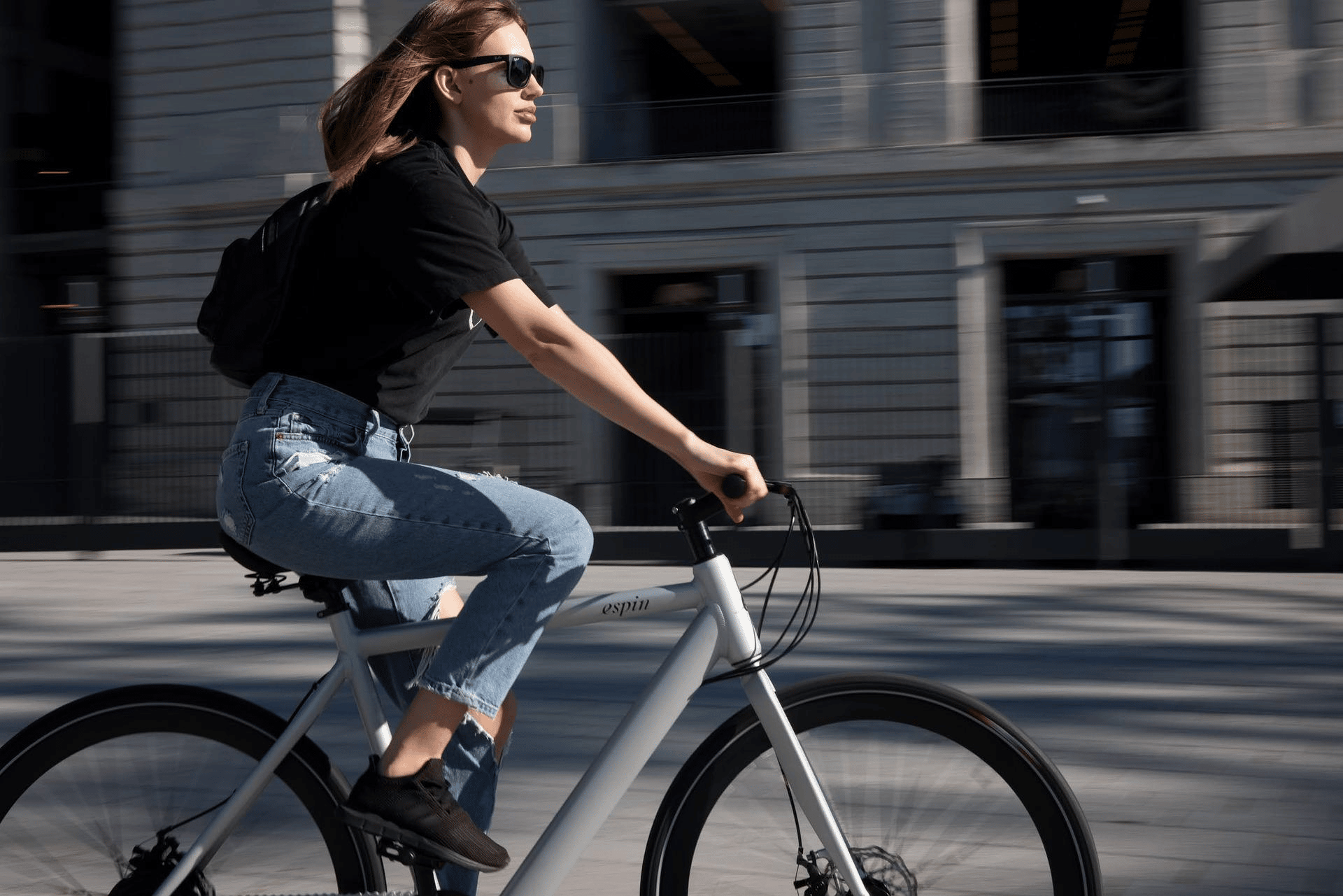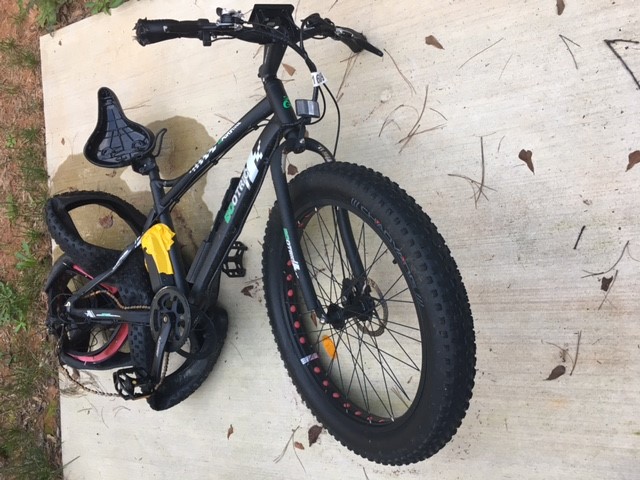Law Lauri sees the world from her , and works make it better.
Bike Law is lucky to get the benefits of Lauri Boxer-Macomber (Bike Law Maine), another female bicycle crash attorney in our Network. And all cyclists, especially women bicyclists, are safer, stronger, more supported, understood, and respected, because of who she is, the work she does, and the way she does it. Lauri is the perfect example of how much methods matter in exacting desirable results. On any size scale, Lauri pays thoughtful attention to the details; the ones that are easily and too often overlooked or ignored.
Women on Bikes: Lauri & Susan B. Anthony
Growing up in rural Connecticut with access to lots of land and trails, she was destined to “learn how to big wheel with the big kids when I was three.” She continues, “I think the training wheels came off my first two-wheel bike at age five. I started utility riding (i.e. riding to the candy store) around age eight. I became a regular bike commuter in college, started bike-packing in my twenties, learned to tandem and group ride in my thirties, took up fat biking in my forties, and I have recently started mountain and gravel riding.”
Lauri reminds me of what cycling feminist Susan B. Anthony so staunchly observed about Women on Bikes: “Let me tell you what I think of bicycling. I think it has done more to emancipate women than anything else in the world. It gives women a feeling of freedom and self-reliance. I stand and rejoice every time I see a woman ride by on a wheel…the picture of free, untrammeled womanhood.”
Her tireless (pun intended) fight for gender equality, resulting in the ratification of the 19th Amendment, occurred just over a 100 years ago. She was arrested for voting in the Presidential election in 1872, and by 1919, women were granted the legal right to vote. But it would be a long time before we were able to join the workforce, own a home, or hold public office. And while women’s rights and opportunities resemble those of our male counterparts more than they did 100 years ago, we still have much to do in so many important facets of how we define our quality of life.
Lauri says, “Historically, most cities, towns, and transportation systems were not planned and built with women and children in mind and lack the safety, accessibility, connectivity and other features that women need to easily get around by bike. Also, in many settings we are still invisible, and when we are seen, we are often treated as secondary or inconsequential.”
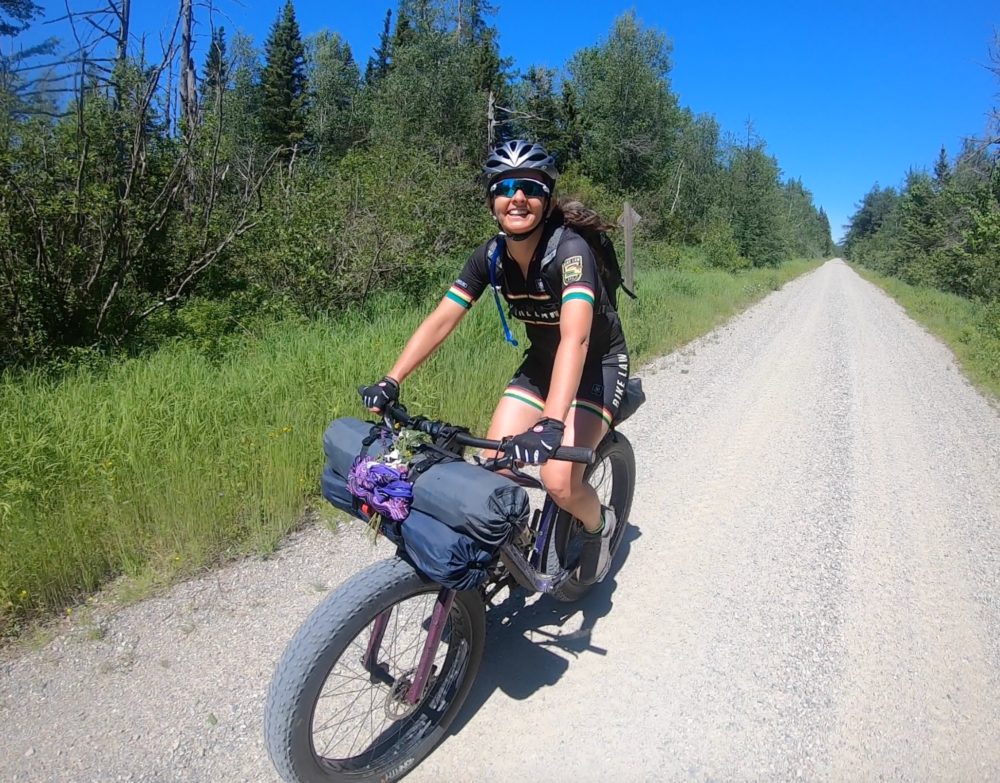
Addressing Gender Inequities
And as accurately and eloquently as Lauri explains the biggest challenges to Women on Bikes, she continues on, offering solutions.
“Among other things, we need more female professionals planning our cities, leading our local, state, and national governments, and out on the roads. Look at Paris under the leadership of Anne Hildago. Think about what it means when an Associate Transport Minister like Julie Anne Genter of New Zealand Minister creates an expectation that roads should be safe enough for women to ride their bikes to the hospital to give birth. I also suggest reading Abbey Seitz’s recent pieces, which opine that the best way to build equitable cities is to have more female transportation planners.”
“In the athletic arena, race and event promoters need to value women. This starts with making sure professional events like the Tour de France are open to women and that women receive equal compensation and media coverage when riding in them. I also invite people to think more about event names and branding in the cycling and triathlon communities, and how women may be indirectly (even if unintentionally) marginalized or categorized through those names and brands. For example, I have never been a fan of the Ironman brand with its capital M, regardless of the decades of amazing female athletes who built the brand and my own participation in an Ironman several years ago. Why should female endurance athletes be rewarded for such an incredible athletic accomplishment by being labeled as a man? Valuing women at athletic events also includes appropriately accommodating female safety, health, travel and other needs and getting rid of females as trophies at finish lines and award ceremonies.”
Ordinarily, the expression of these gender inequities would be cloaked in frustration, anger, and sometimes hopelessness. But talking with Lauri reminds me that some of the consequences for such inequities are: fortitude, compassion, creativity, committing ourselves to a different (more positive) perspective, and turning lemons into lemonade (some inherently female qualities). And they are why we have and do bring so much that is necessary and unique to any table at which we have a seat (or pull up a chair without a formal invitation. The more the merrier, right?!).
We’ve come such a long way from the safety bike and inequities of Susan B Anthony’s time in history, but we haven’t come far enough by a long shot and what’s happening in the world around us has deeply impacted all of us at Bike Law for so many reasons and in so many ways.
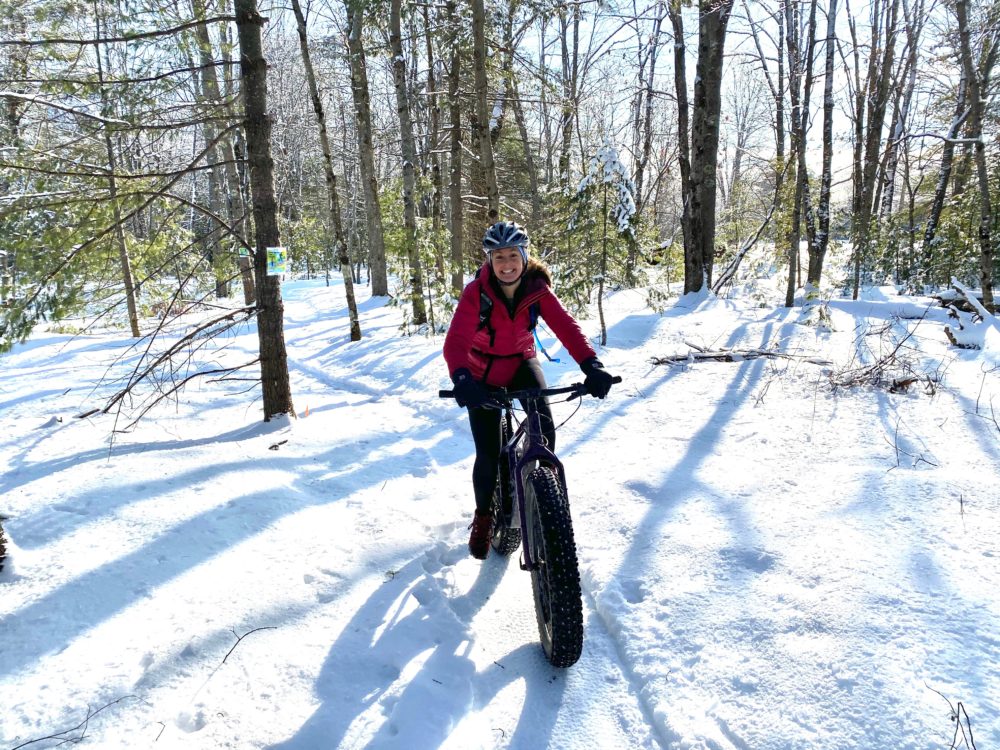
Front Row Seat to Troubling Times
Lauri opens up and gets intimate with her explanation of how some of these contemporary challenges have affected her and the many hats she wears as a woman, lawyer, cyclist, and activist in her community.
“While current events have strengthened my belief in the “power of the bike” to address health, environmental, social, and transportation problems, I have admittedly felt uncomfortable on my bike on a number of occasions over the last six months. As those who ride regularly know, riding leaves you exposed—for better or for worse. I have felt the current crises, the inequities, and the hardships more deeply because of being on my bicycle. I have ridden past the family member pressed up against the window of a nursing home trying to express his love to the person inside that home, taken my bike to a student-led Juneteenth rally and heard things not easy to digest, woven through streets with homeless people on them searching for a place to go during the pandemic, and past large barns with politically divisive signs on them. With these experiences, I believe I have become more empathetic and motivated to work towards change.“
“In addition, to the deepened empathy that comes with discomfort, I have also felt guilt about the dichotomies I am experiencing. Regardless of the number of hours I work, when I ride my bike for pleasure, I feel pangs of guilt about the increased flexibility in my work schedule and my ability to find time for riding when there were so many people around me suffering and with far less autonomy and choice in their workplaces and homes. And in the workplace, I am regularly exposed to people directly and/or indirectly experiencing consequences of racial and social inequalities at greater extremes in part because of access to safe and/or reliable transportation.“
“All of this case caused me to think a lot more about the future of our transportation system and public roadways, as well as to get more involved in local campaigns to slow streets, invest in smart growth and create more spaces for people. In getting more involved in these efforts, I have come to the conclusion that although there are many well-intended people behind these initiatives, we are still not hearing from a lot of voices that need to be at the table to make good decisions. It has been an eye-opening experience for me listening to, and reading about, the different responses to closed streets and slow streets in cities across the country from Oakland, California to my own city of Portland, Maine. All of these experiences have motivated me to become a better listener, and to educate myself more about how I can personally and professionally help foster more inclusivity and diversity in transportation and decision-making processes, as well as in the Maine legal profession where the consequences of these deficiencies and inequalities often play out.”
What Lauri said strikes me as one of the most thoughtful and thought-provoking examinations of the world around us and what it means to be present and alive, embracing the discomfort that accompanies transparency about how much work there is to do and how much we can learn from one another if we want to secure an inclusive and altruistic culture of which bicycling is a part.
The Answer is More Women on Bikes
The answer to the riddle is more women, not less. More of us in the workplace. More of us making important decisions. More of us speaking up. More of us in the saddle. Lauri understands this, consistently practices her belief that women play a pivotal role in the scalable growth of safe cycling, and encourages all of us to do the same.
Lauri says, “Logically, women make up over half of the global population, so it makes complete sense from a demographic standpoint to see us as important and integral to the growth and sustainability of cycling. More importantly, women have valuable experiences, perspectives and insight on community planning, infrastructure, product design, safety and accessibility, and other issues that can benefit everyone who cycles, regardless of gender.”
“When I discuss riding with women who do not ride, there are some general trends as to why they have refrained from riding (i.e. fear of being hit or crashing, lack of mechanical or operational skills, insecurities about physical appearance or abilities), but I also find that each woman has very individual and specific barriers holding her back from riding. For example, just recently a single mom shared with me the fact that she’d love to ride her bike as much as I do, but she did not have access to safe and reliable childcare. Similarly, a good friend told me about how her mother’s permanent disfigurement from a surface condition crash decades ago had deterred her from bicycle commuting for years.“
“One of the best things we can do to encourage and invite women to ride is to really listen to them speak about the specific factors, feelings, and experiences that are holding them back from riding. Once women feel heard, it is much easier for them to start generating their own solutions and/or listening to input from others. Another thing we can do is create spaces for dialogue about riding and opportunities for exposure to riding (closed streets, community forums, intro to riding classes, events for people of all abilities, etc.). It is also critical that we invest in building age, class, ethnic and racial diversity in our clubs, riding communities, and bike shops, as it is hard to encourage women and others to begin riding if they do not feel a sense of inclusivity and belonging. Along that same vein, we need to be supporting initiatives of our state bicycle coalitions and other organizations that are designed to get people on bikes. In Maine, for example, the Bicycle Coalition of Maine and the Gear Hub offer Bikes for All Mainers—a multi-week introductory class on bicycling. Equally important to decreasing barriers to cycling for women and others are continued advocacy efforts aimed at getting local, state and national public safety and transportation agencies to invest in complete streets, better bicycling infrastructure, and social and cultural shifts on attitudes about the acceptability of distracted driving and speeding on our roadways.”
Prioritizing the Right Things
Lauri’s brilliance, unique perspective, and comprehensive approach to improving the quality of life and bicycling for herself, other women in the saddle, and all members of our human cycling family is difficult to capture in a way that does her justice. Read more about her and her Bike Law practice here.
What I’ve learned from her is that there is a huge difference between winning and living. One of these (gender associated) biological imperatives prioritizes hierarchy predicated upon competition. The other encourages safety, security, community, and maintenance.
Summed up by the right woman for the job, Lauri concludes, “I join with those who believe that the bicycle offers a solution to most of our global health, environmental and transportation problems and crises. On a personal level, apart from strong coffee, my bikes are the material objects in my life that bring me the most joy. I have a very integrated and symbiotic relationship with my bicycles. Biking is woven into almost everything I do—from my professional work, to my volunteer work, to my grocery shopping.”
“I take care of my bicycles and bicycling communities, and they take care of me. “
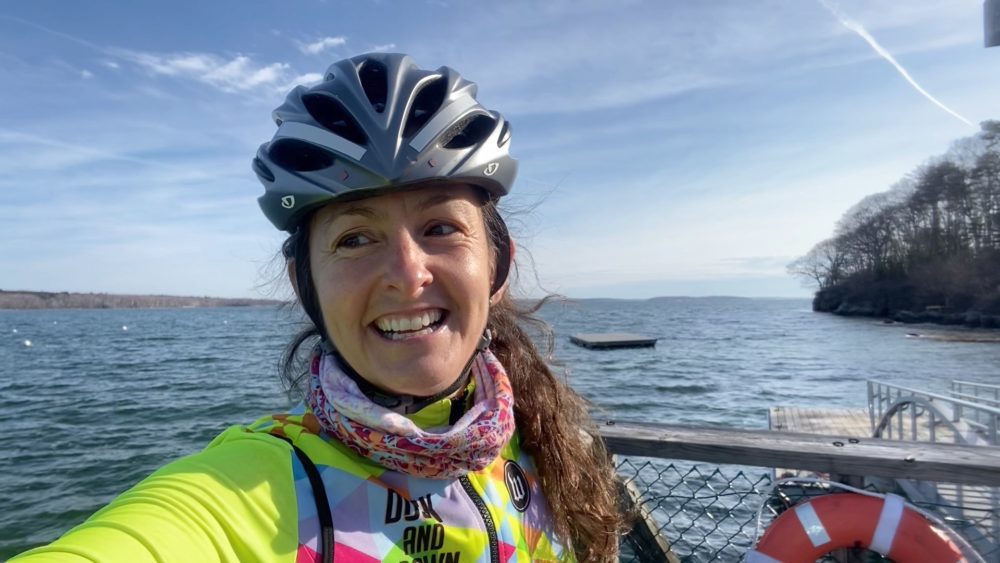

Rachael Maney is the Director of the Bike Law Network and of the non-profit Bike Law Foundation.



